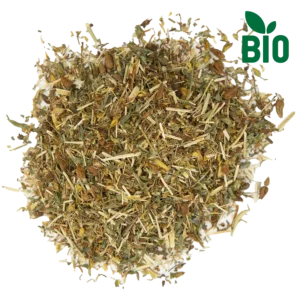St’ John’s wort (Hypericum perforatum) or Hypericum is one of the best-known herbs with healing properties in the world of herbal medicine. More specifically, it is a flowering plant of the Hypericaceae family and thrives mainly in arid regions of Europe, North Africa and Asia.
St. John’s wort or Hypericum is a low perennial with yellow flowers that bloom from June to September. A characteristic feature of the plant is the translucent spots and blackish-red dots on the flowers when light falls on them. This is where the essential oils and resins are found.
In ancient times, its healing properties were considered truly remarkable. In more detail, the well-known herbalist of ancient Greece, Dioscorides, as well as Galen, recommended it against lumbosacralgia, but also as a diuretic, healing and hemostatic. Its topical use has since then helped significantly in the healing of burns, while its consumption as a decoction relieved indigestion and abdominal pains.

In addition, during the Middle Ages, the plant was considered to have magical properties as it was believed to ward off evil spirits through its fragrance alone. These properties were particularly important if it was collected on 24 June, the day on which John the Baptist is celebrated. According to tradition, its name comes from the Knights of St. John as it was used to heal the wounds of wounded crusaders.
Picture: Patrikselzak
Moreover, as they believed that it would incite evil, they forced the mad to drink its decoction. More generally, they believed that Hypericum was such a valuable and blessed plant that there was no other like it. But apart from its medicinal use, they also used St. John’s wort as a raw material for the production of yellow dye. They could thus dye wool and silk yarns.
Prominent botanists and healers such as Gerard have used this herb as a valuable treatment against wounds, in the form of ointment. Its so widespread and effective use in Europe, especially after the 16th century, made it the best natural herb for swellings and wounds. As a result, it became widely used in surgery and was included in the first official London Pharmacopoeia as Oleum Hyperici.
Its reference as Hypericum comes from ancient sources. Probably, according to Linnaeus, its name is due to its ability to exorcise evil and its placement over religious icons. Hence the combination of the words ‘pro’ and ‘icon’. In addition, its reddish-black spots symbolize the blood of John the Baptist, while the perforated surface of its leaves was created by tears.
From what we have mentioned above, we realize that St’ John’s wort is ranked as one of the most important medicinal herbs. After many researches and studies, besides its healing properties, St’ John’s wort has been found to help in the treatment of mild and moderate depression and other mental disorders.

The St’ John’s wort contains the substance hypericin. It is the most active substance in the herb and is found throughout the plant, with the highest concentration in the flowering tops. It also contains flavonoids, xanthones, phenolic acids and essential oils. More specifically, hypericin and hyperforin are two compounds that have remarkable antidepressant and anti-inflammatory properties. Its consumption in any form has a mild sedative and analgesic effect. This increases the levels of certain chemicals such as serotonin, which is the hormone that helps regulate our mood.
Εικόνα: mikhailsabela
Let’s take a closer look at the excellent properties of St’ John’s wort and its benefits to our body:
– St’ John’s wort is known for its antidepressant effect. Its active ingredients, such as hypericin, help increase serotonin levels in the brain, improving mood and relieving mild to moderate depression. At the same time, it greatly improves the quality of sleep.
– It has powerful anti-inflammatory properties that make it useful in treating inflammation. It can also help in relieving muscle aches and headaches.
– Its extract is also known for its ability to speed up the healing of wounds and burns. It can be used topically with ointments for this purpose.
– The antioxidant compounds it contains protect cells. This can help prevent aging and its related diseases.
– Certain compounds in St’ John’s wort have antibacterial and antiviral properties, which can help fight bacterial infections and treat viral infections, such as those of herpes viruses.
– St. John’s Wort contains compounds with potential neuroprotective properties, such as antioxidants, which could theoretically help protect brain cells from damage associated with Alzheimer’s disease.
In addition, this herb is diuretic, antispasmodic, suitable for stomach disorders while regulating the menstrual cycle. The form, proportions and ways of using this herb depend on the particular problem to be treated.
In the trade you can find many forms in which it can be received.
It is important to follow the instructions for use and consult a specialist before using it, especially if you are taking medication or have health problems. As with any herb, St’ John’s wort cannot replace the treatment recommended by your doctor. At the same time, its regular use should be done with great care. In some cases, it may cause side effects such as gastrointestinal discomfort. In addition, the active substance hypericin may cause photosensitivity so it would be advisable to use it only when there is no direct exposure to the sun.
Finally, it is not recommended to use the herb concurrently with medical treatment, and for women who are pregnant or breastfeeding, a doctor’s advice is necessary before use.
In summary, St’ John’s wort is a plant with many therapeutic properties, which stands out for its antidepressant and anti-inflammatory action. It is a valuable natural ally in the treatment of everyday problems that we all have to deal with.
We, at tofillo, have organic St’ John’s wort of excellent quality. Come and discover with us the amazing world of nature!
Find all our healing herbs here.
Subscribe to our newsletter to stay informed about herbs, recipes, exclusive offers, and receive a 15% discount on your first order!

Ευχαριστούμε πολύ τα παρακάτω websites για τη συνδρομή τους σε επιπρόσθετο, ελεύθερο φωτογραφικό υλικό (free stock) που χρησιμοποιείται στην ιστοσελίδα μας:
Pixabay.com
Pexels.com
Unsplash.com
Freepik.com
Canva.com
Adobe.com
Σταύρος Δεβεράκης (Φωτογράφος)
Many thanks to the following websites for their subscription to additional, free stock photography used on our website:
Pixabay.com
Pexels.com
Unsplash.com
Freepik.com
Canva.com
Adobe.com
Stavros Deverakis (Photographer)